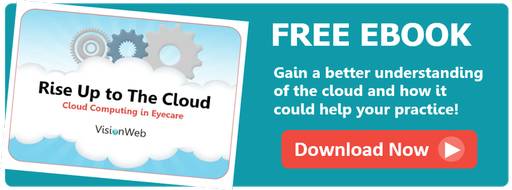3 Totally Lame Misconceptions about Cloud Computing in Optical
When it comes to technology, it seems like everyone has different opinions on what is the best. And, some people prefer sticking with the same technology they've been using for years because they are comfortable with it. For example, I know my dad is still living in the flip phone era, and he loves it. His next phone will probably be another flip phone, assuming that they still exist when that day comes! And it's all because he is so comfortable and familiar with that same technology he has always been using. While that works for him, he's also missing out on so many features and benefits that could be making his day to day life easier, and a little more fun, if he were to upgrade his technology.
While we know all of the great things that the cloud can do for businesses of all sizes, there are still some misconceptions that people face when it comes to cloud computing in optical. And these misconceptions might be causing people to stick with the technology they are comfortable using, even though the cloud can help increase day-to-day efficiency in any business.
What Misconceptions Do You Believe about Cloud Computing in Optical?
 The Cloud is Totally Just a Fad
The Cloud is Totally Just a Fad
With technology changing so frequently, it's easy to assume that the cloud could just be a fad. Well, to be honest, it's already been around long enough not to be considered just a fad. Cloud technology is being used for so many different applications. It's used for simple things like email, social media, music streaming, and online shopping. But, it's also used for more complex things like EHR software, online banking, and government security. With all of those things in mind you can see how often you are using the cloud on a daily basis, and it's here to stay.
The Cloud is Totally More Expensive
A lot of times new and improved technology is also associated with a big price tag. But when it comes to using the cloud in your practice it can help you save on a lot of expenses. For example, if you're using a client-server software currently in your office, it's likely that you've had to hire an IT consultant to help manage and secure the servers in your practice. With cloud software though, the cloud vendor manages your software and servers for you and it's all included in the price of the software. You also won't have to purchase updated versions of the software to install because updates and upgrades happen automatically, at no extra cost to you.
Another thing to think about when it comes to software in your practice is integrating different software that you need to complete all of your tasks. Cloud software is typically easier to integrate and often times comes with embedded tools so that you don't have to purchase additional software to get the job done.
Data is Totally Better Protected in Your Office
Security is often a big concern when it comes to the cloud, but in reality, the cloud is a very safe place to be storing your data. In most cases, compared to the security that you can offer your data in your own practice, the cloud is usually more secure when it comes to storing and sharing your data. And because security in the cloud is such a big concern, your cloud vendor is going to work extra hard to make sure that their security is top of the line. The best security includes things like data encryption, multiple databases, secure data centers with physical controls to prevent unauthorized access, and several other measures that ensure the privacy of your data at all times!
Want to learn more about how the cloud can help your eyecare practice? Check out the eBook, Rise up to The Cloud.

